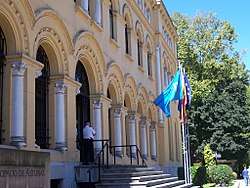Council of Government of the Principality of Asturias
The Government of the Principality of Asturias, also known as the Council of Government of the Principality of Asturias is the executive branch of the General Junta of Asturias, one of the autonomous communities of Spain. It is responsible for the political action, reglementation and administration of the government of the autonomous region.[1]
 | |
| Government overview | |
|---|---|
| Formed | 1982 |
| Jurisdiction | Asturias |
| Headquarters | Oviedo |
| Minister responsible | |
| Website | www.asturias.es |
.svg.png) |
|---|
| This article is part of a series on the politics and government of Asturias |
|
Government |
|
|
Elections
|
|
Divisions
|

Headquarters of the Presidency of the Government
It has its headquarters in Oviedo.
Composition
The President of the Principality of Asturias is the head of government, elected by the members of the General Junta. He appoints one vice-president and the counselors. These ones can be members of the General Junta or not.
Current composition (2015–2019)
| ← Barbón government → (24 July 2019 – present) | |||
| Office | Name | Term of office | Ref. |
|---|---|---|---|
| President | Adrián Barbón | 16 July 2019 – present | [2] |
| Vice President | Juan Cofiño | 24 July 2019 – present | [3][4] |
| Minister of Infrastructures, Environment and Climatic Change | |||
| Minister of Presidency | Rita Camblor | 24 July 2019 – present | [3][4] |
| Minister of Finance | Ana Cárcaba | 24 July 2019 – present | [3][4] |
| Minister of Industry, Employment and Economic Promotion | Enrique Fernández | 24 July 2019 – present | [3][4] |
| Minister of Health | Pablo Fernández | 24 July 2019 – present | [3][4] |
| Minister of Social Rights and Welfare | Melania Álvarez | 24 July 2019 – present | [3][4] |
| Minister of Rural Development, Agro-livestocks and Fisheries | Alejandro Calvo | 24 July 2019 – present | [3][4] |
| Minister of Education | Carmen Suárez | 24 July 2019 – present | [3][4] |
| Minister of Culture, Language Policy and Tourism | Berta Piñán (es) | 24 July 2019 – present | [3][4] |
| Minister of Science, Innovation and University | Borja Sánchez | 24 July 2019 – present | [3][4] |
gollark: It's also possible that more complex systems may have been impractical before computers came along, although that doesn't apply to, say, approval voting.
gollark: First-past-the-post is the simplest and most obvious thing you're likely to imagine if you want people to "vote for things", and it's entirely possible people didn't look too hard.
gollark: I don't know if the people designing electoral systems actually did think of voting systems which are popular now and discard them, but it's not *that* much of a reason to not adopt new ones.
gollark: There are plenty of things in, say, maths, which could have been thought up ages ago, and seem stupidly obvious now, but weren't. Such as modern place value notation.
gollark: Obvious things now may just not have been then.
References
- Statute of Autonomy of the Principality of Asturias
- "Disposiciones Generales Publicadas en el BOE - Presidencia del Gobierno" (PDF). Boletín Oficial del Principado de Asturias (in Spanish). No. 137. Oviedo, Spain: Government of Asturias. 17 July 2019. Retrieved 21 July 2019.
- "Barbón recupera la figura del vicepresidente y anuncia un Gobierno con diez consejerías" (in Spanish). La Nueva España. 21 July 2019.
- "Principado de Asturias: Autoridades y Personal - Presidencia del Principado de Asturias" (PDF). Boletín Oficial del Principado de Asturias (in Spanish). No. 143. Oviedo, Spain: Government of Asturias. 24 July 2019. ISSN 1579-7252. Retrieved 27 July 2019.
External links
This article is issued from Wikipedia. The text is licensed under Creative Commons - Attribution - Sharealike. Additional terms may apply for the media files.